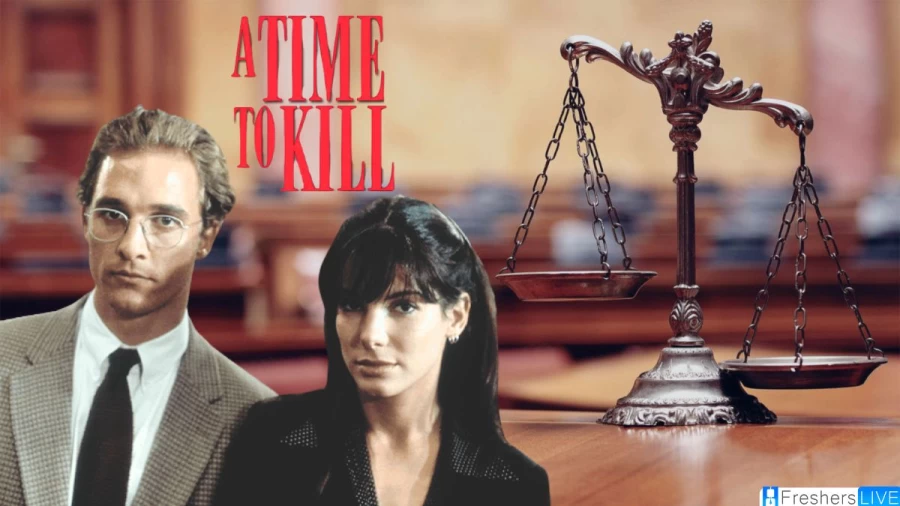Is a Time to Kill Based on a True Story? The Ending Explained
by Ushapriyanga
Updated May 06, 2023

A Time To Kill Info
In 1996, a legal drama film titled "A Time to Kill" was released, which was based on John Grisham's novel of the same name published in 1989. The movie features a star-studded cast, including Sandra Bullock, Samuel L. Jackson, Matthew McConaughey, Kevin Spacey, and supporting roles played by Donald and Kiefer Sutherland.
While the reviews for the film were mixed, it was a commercial success, grossing $152 million worldwide. This movie was the second of Joel Schumacher's directorial adaptations of Grisham's novels, with the first being "The Client" released two years earlier.
Is A Time To Kill Based on a True Story?
The 1996 American legal drama film "A Time to Kill" is famously based on John Grisham's 1989 novel of the same title. However, the story's origins are rooted in a real-life heinous crime that left a lasting impact.
Grisham, who was once a lawyer himself, based the novel on a case he witnessed firsthand in 1984. In a 2013 interview with Clarion-Ledger, he revealed the personal nature of the story and his reluctance to represent the defendant. The crime occurred near his law office, and he later learned of Willie James Harris's cold-hearted admission to raping two sisters from Southaven.
During the same interview, Grisham expressed his disdain for Harris, referring to him as a "nasty character." The crime, which occurred on July 11, 1984, involved Harris and an accomplice breaking into a farmhouse. Harris had a prior criminal record, having been arrested for burglary and robbery, which resulted in several years of imprisonment.
Unfortunately, his time behind bars did not rehabilitate him, and he went on to commit the heinous act of raping two sisters, aged 16 and 12. After graduating from the University of Mississippi law school in 1981, Grisham's colleague was appointed to represent the defendant in court.
Given the abundance of evidence, including written and recorded confessions and fingerprints, the trial was already a clear-cut case. Nonetheless, Grisham attended the trial in Hernando, which began on October 29, 1984, as he had no clients to attend to and decided to "hang out at court."
A Time To Kill Plot
The film "A Time to Kill" revolves around the story of Tonya Hailey, a young African American girl who is brutally raped and beaten by two white men in Canton, Mississippi. Her father, Carl Lee Hailey, seeks the help of white lawyer Jake Brigance to defend him after he kills the two rapists in an act of revenge. The case gains national media attention, and district attorney Rufus Buckley seeks the death penalty for Carl Lee.
The Klan gets involved, and their attacks on Brigance escalate. Despite the odds against them, Brigance and his defense team fight fiercely for Carl Lee's freedom. During closing arguments, Brigance delivers an emotional speech that leads to Carl Lee's acquittal. The film ends with Brigance celebrating with Carl Lee and their families at a cookout, proving that racial differences can be overcome.
A Time To Kill Ending Explained
During his closing argument, Brigance asserts that if a jury can be swayed to spare the life of a white man who committed a revenge killing, then they should be capable of doing the same for a black man. The jury eventually finds Carl Lee not guilty, and jubilation breaks out among his supporters outside the courthouse. However, the Klan members become violent once again.
Sheriff Walls arrests Freddie Lee and a corrupt deputy who is a Klan member. The movie concludes with Brigance bringing his family to a cookout at Carl Lee's home, where Carl Lee appears surprised but eventually smiles when Brigance suggests that their children play together.
A Time To Kill Ending Review
In the film, "A Time to Kill," lawyer Jake Brigance takes on the case of Carl Lee Hailey, a black man whose daughter was brutally raped and beaten by two white men in the Deep South during the 1960s. Despite the evidence of the heinous crime, Carl Lee is unable to attain justice and takes matters into his own hands by killing the perpetrators.
This sparks outrage among the local KKK, who threaten and terrorize Brigance and his family, as well as one of his assistants, Ellen Roark. With the odds stacked against him, Brigance finds himself with few options and resorts to arguing that if the races were reversed, the outcome would be different.
This argument proves successful, and Hailey is ultimately acquitted of the charges. The film concludes with Brigance and his wife visiting Hailey's home to allow their daughters to play together.
Is A Time To Kill Based on a True Story-FAQs
"A Time to Kill" is a legal drama film about a black man named Carl Lee Hailey who kills two white men who raped and brutally beat his young daughter.
The movie features a star-studded cast, including Sandra Bullock, Samuel L. Jackson, Matthew McConaughey, and Kevin Spacey. Supporting roles are played by Donald and Kiefer Sutherland.
Yes, the movie is based on a novel of the same name by John Grisham, which was published in 1989.
The movie was directed by Joel Schumacher, who also directed the film adaptation of Grisham's novel "The Client" two years earlier.







